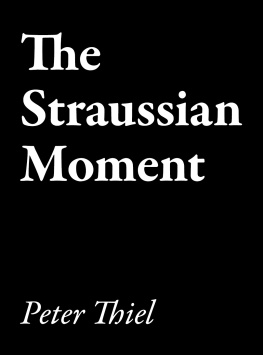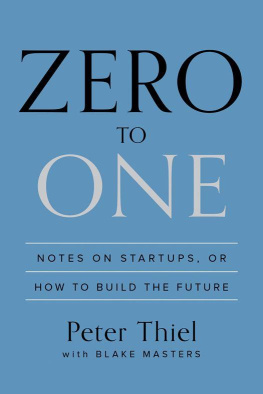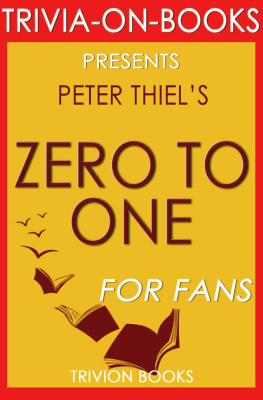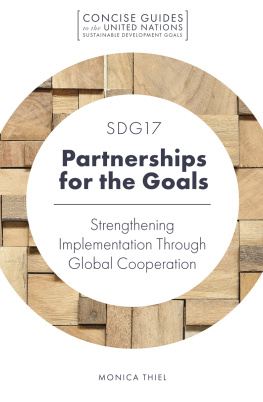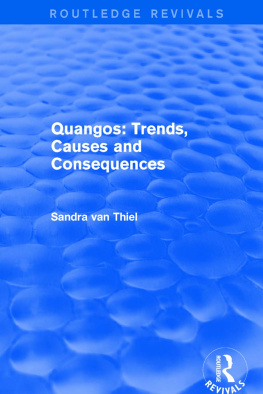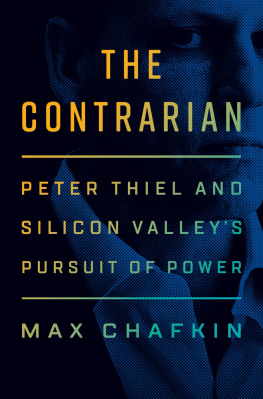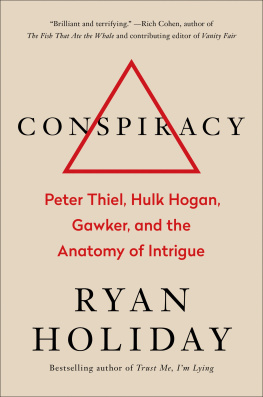Peter Thiel - The Straussian Moment
Here you can read online Peter Thiel - The Straussian Moment full text of the book (entire story) in english for free. Download pdf and epub, get meaning, cover and reviews about this ebook. year: 2007, publisher: Michigan State University Press, genre: Science. Description of the work, (preface) as well as reviews are available. Best literature library LitArk.com created for fans of good reading and offers a wide selection of genres:
Romance novel
Science fiction
Adventure
Detective
Science
History
Home and family
Prose
Art
Politics
Computer
Non-fiction
Religion
Business
Children
Humor
Choose a favorite category and find really read worthwhile books. Enjoy immersion in the world of imagination, feel the emotions of the characters or learn something new for yourself, make an fascinating discovery.
- Book:The Straussian Moment
- Author:
- Publisher:Michigan State University Press
- Genre:
- Year:2007
- Rating:3 / 5
- Favourites:Add to favourites
- Your mark:
- 60
- 1
- 2
- 3
- 4
- 5
The Straussian Moment: summary, description and annotation
We offer to read an annotation, description, summary or preface (depends on what the author of the book "The Straussian Moment" wrote himself). If you haven't found the necessary information about the book — write in the comments, we will try to find it.
The Straussian Moment — read online for free the complete book (whole text) full work
Below is the text of the book, divided by pages. System saving the place of the last page read, allows you to conveniently read the book "The Straussian Moment" online for free, without having to search again every time where you left off. Put a bookmark, and you can go to the page where you finished reading at any time.
Font size:
Interval:
Bookmark:
Peter Thiel
President, Clarium Capital Management
For I dipt into the future, far as human eye could see,
Saw the Vision of the world, and all the wonder that would be;
Saw the heavens fill with commerce, argosies of magic sails,
Pilots of the purple twilight dropping down with costly bales;
Heard the heavens fill with shouting, and there raind a ghastly dew
From the nations airy navies grappling in the central blue;
Far along the world-wide whisper of the south-wind rushing warm,
With the standards of the peoples plunging thro the thunder-storm;
Till the war-drum throbbd no longer, and the battle-flags were furld
In the Parliament of man, the Federation of the world.
There the common sense of most shall hold a fretful realm in awe,
And the kindly earth shall slumber, lapt in universal law.
Alfred, Lord Tennyson, Locksley Hall
The twenty-first century started with a bang on September 11, 2001. In those shocking hours, the entire political and military framework of the nineteenth and twentieth centuries, and indeed of the modern age, with its emphasis on deterrent armies, rational nation-states, public debates, and international diplomacy, was called into question. For how could mere talking or even great force deter a handful of crazy, determined, and suicidal persons who seemingly operated outside of all the norms of the liberal West? And what needed now to be done, given that technology had advanced to a point where a tiny number of people could inflict unprecedented levels of damage and death?
The awareness of the Wests vulnerability called for a new compromise, and this new compromise inexorably demanded more security at the expense of less freedom. On the narrow level of public policy, there needed to be more x-ray machines at airports; more security guards on airplanes; more identification cards and invasions of privacy; and fewer rights for some of the accused. Overnight, the fundamentalist civil rights mania of the American Civil Liberties Union (ACLU), which spoke in the language of inviolable individual rights, was rendered an unviable anachronism.
Even as the debate over freedom and security gathered strength, whatever military force could be mustered was used to track down those responsible for the violence of September 11. Despite rapid mobilization, those efforts met with limited success. Americas antiquated military was not suited to fight such an enemy, for the enemy needed to be pursued not only in America, or in a handful of terrorist camps in Afghanistan, but to the very ends of the Earth. Even worse, like the Hydra, the enemy proliferated, so that for every slain jihadist, ten more arose to seek martyrdom in perverse emulation.
On the broader level of international cooperation and development, September 11 called for wholly different arrangements. The issue of unilateralism, and of the institutions designed to provide a cover for unilateralism, could be raised publicly by serious people for the first time since 1945. Much has been said elsewhere about the relative roles of the United States and the United Nations in the political sphere, but the underlying debates extended to even more fundamental issues.
For present purposes, it is worth drawing attention to one such fundamental issue, the twentieth-century policy debate about the containment of violence. Following World War II, the centrist consensus on international development called for enormous wealth transfers from the developed to the developing world. Under the aegis of the World Bank, the International Monetary Fund, and an array of other organizations, hundreds of billions of dollars were funneled (in cheap loans or outright grants) to Third World governments, thereby, as the theory went, fostering economic growth and prosperity. But was this consensus right? Are economic incentives in fact powerful enough to contain violence?
Ex ante, wealth transfers made a certain amount of sense in the late 1940s. Those who had taken Marx seriously and were haunted by the specter of communist revolution hoped that the wealth transfer apparatus would help win the Cold War and bring about world peace. For the Rockefellers to keep their fortunes (and their heads), it was perhaps prudent for them to give some of what they had to the wretched of the Earth and make them a little bit less wretched.
But ex post, one wonders how policymakers could have been so nave. Let us set aside the inconvenient fact that the wealth transfer apparatus never worked as advertised, so that the Wests wealth was largely squandered on white elephant projects, no real economic development took place, and even in the best of cases the money simply circulated back to the West, ending up in Swiss bank accounts held by Third World dictators. As recent events have illustrated vividly, the real problem with the theory goes much deeper. For when the long-expected blow finally came, it did not come from the favelas of Rio de Janeiro, or from starving peasants in Burkina Faso, or from the Tibetan yak herders earning less than a dollar a day. On the contrary, it came from a direction none of the modern theories had predicted: the perpetrators were upper-middle-class Saudi Arabians, often with college degrees and with great expectations. Their mastermind, Osama bin Laden, had inherited a fortune now worth an estimated $250 million, mostly made during the Saudi oil boom of the 1970s. Had he been born in America, bin Laden could have been a Rockefeller.
In this way, the singular example of bin Laden and his followers has rendered incomplete the economically motivated political thought that has dominated the modern West. From The Wealth of Nations on the right to Das Kapital on the left, and to Hegel and Kant and their many followers somewhere in between, the brute facts of September 11 demand a reexamination of the foundations of modern politics. The openly intellectual agenda of this essay is to suggest what that reexamination entails.
From the Enlightenment on, modern political philosophy has been characterized by the abandonment of a set of questions that an earlier age had deemed central: What is a well-lived life? What does it mean to be human? What is the nature of the city and humanity? How does culture and religion fit into all of this? For the modern world, the death of God was followed by the disappearance of the question of human nature.
This disappearance had many repercussions. If humans can be approximated as rational economic actors (and, ultimately, even Adam Smith and Karl Marx agree on this point), then those who seek glory in the name of God or country appear odd; but if such odd people are commonplace and capable of asserting themselves with explosive force, then the account of politics that pretends they do not exist needs to be reexamined.
There is, of course, an older Western tradition, a tradition that offered a less dogmatically economic view of human nature. That older account realized that not all people are so modest and lacking in ambition that they will content themselves, like Voltaires Candide, with cultivating their gardens. Instead, it recognized that humans are potentially evil or at least dangerous beings; and, while there are vast differences between the Christian virtues of Augustine and the pagan virtues of Machiavelli, neither thinker would have dared lose sight of the problematic nature of humanity .
The most direct method for comprehending a world in which not all human beings are homo economicus would therefore appear to involve a return to some version of the older tradition. However, before we try to embark on that return, there is another mystery we must confront: Why did the older tradition fail in the first place? After all, it seemed to ask some obvious and important questions. How could these questions simply be abandoned and forgotten?
Font size:
Interval:
Bookmark:
Similar books «The Straussian Moment»
Look at similar books to The Straussian Moment. We have selected literature similar in name and meaning in the hope of providing readers with more options to find new, interesting, not yet read works.
Discussion, reviews of the book The Straussian Moment and just readers' own opinions. Leave your comments, write what you think about the work, its meaning or the main characters. Specify what exactly you liked and what you didn't like, and why you think so.

